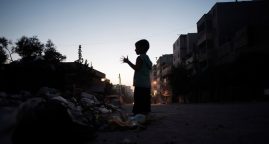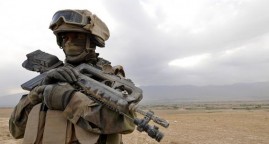Everything you need to know about the latest Syria peace talks
Article published on IRIN website on 21/02/2017
Geneva IV: Who is coming? What do they want? And will it matter?
Hopes are low for the Syrian peace talks set to begin on Thursday in Geneva, but that may not matter much. As the war in Syria moves towards a strategic endgame, the faltering peace process has begun to drift away from its past focus on a political transition, a shift that will ultimately have major ramifications for the country’s future.
The results of the two preceding rounds of talks in the Kazakh capital of Astana have been somewhat underwhelming. Conceived of as a political track to complement the ceasefire declared by Russia, Turkey, and Iran on 30 December, last week’s round failed to even adopt a closing statement. While Moscow trumpets the signing of a trilateral truce-monitoring agreement, it appears to be another hollow statement of intent without a credible enforcement mechanism.
Astana’s role in the peace process is separate, but not unimportant. American diplomats (who attended as observers along with Jordan and UN Syria envoy Staffan de Mistura) seem content with letting Russia lead the way. Like other Western and Arab nations, they remain unwilling to give their full blessing to the Astana track, fearing it will be used by Russia and Iran to displace de Mistura’s UN-led process in Geneva.
Turkey, too, has signalled that the two tracks should be kept apart. “Astana has never been an alternative to Geneva,” Foreign Minister Mevlüt Çavuşoğlu said on Sunday, adding that although Astana has been “a good confidence-building measure and helpful to maintain a ceasefire”, the UN-led talks in Geneva remain “the main basis for the political solution and transition”.
Indeed, Geneva has been at the centre of international peace efforts since the Syrian conflict began in 2011.
In June 2012, the United States, Russia, and other nations gathered there for a meeting, later dubbed Geneva I, producing a final statement that did not explicitly mention Syrian President Bashar al-Assad but demanded a “transitional governing body” to administer the end of his political system. Its 2012 document served as a guiding framework for Syrian-Syrian talks in January and February 2014 (“Geneva II”) and also influenced the negotiating round in February 2016 (“Geneva III”). So now, the time has come for Geneva IV – but these negotiations may do more to widen rifts than to heal them.
Who represents the Syrian opposition?
The Syrian war is multi-sided and the country is split into enclaves held by four main actors: al-Assad’s government, the so-called Islamic State (IS), the Rojava region ruled by Syrian Kurds, and the mostly Sunni Arab rebels in northern Syria, near Homs, Damascus, and on the Jordanian border.
While al-Assad’s regime and the Rojava Kurds are centrally governed and capable of picking their own negotiators (and IS is excluded from the talks), the Sunni Arab rebels suffer from crippling internal divisions that have prevented them from forming a representative delegation.
In October 2015, an opposition conference in the Saudi capital of Riyadh elected a High Negotiating Committee (HNC) to serve as the rebels’ diplomatic representative. The HNC has been endorsed by most of the opposition factions who rely on support from Turkey, Saudi Arabia, the United States, Qatar, France, the United Kingdom, and Jordan. That includes a number of second and third tier armed insurgent groups, such as the Eastern Ghouta-based Islam Army and its local rival Failaq al-Rahman, the Muslim Brotherhood-linked Failaq al-Sham, and a smattering of smaller Free Syrian Army-flagged factions in the Jordanian and Turkish borderlands.
However, the two biggest factions in rebel-held Syria refuse to be represented by the HNC. Tahrir al-Sham, which is dominated by hardline Islamists with strong ties to al-Qaeda, views the HNC as a counter-revolutionary pawn of the West and opposes negotiations altogether. Another big Islamist group, Ahrar al-Sham, has responded to Turkish prodding by accepting the principle of negotiations, but it remains internally divided and wary of provoking a clash with Tahrir al-Sham.
With neither of these factions bound by deals in Geneva, the HNC may still negotiate, but it would have great trouble implementing any far-ranging agreement – a point not lost on al-Assad’s government.
The anti-HNC factions
The run-up to Geneva II and III saw Moscow push for the inclusion of unaffiliated secular-leftist dissidents in the HNC delegation, as a way of shaping opposition representation and stirring up conflict among al-Assad’s rivals.
The Russian-backed groups are very small, hostile to armed rebellion, and typically seek some sort of compromise with the Syrian government. Although some have a genuine dissident background, others do not and appear connected to patrons in Damascus or Moscow. HNC members tend to view them as enemy spies and want nothing to do with them.
Before Geneva IV, members of the HNC reportedly held preliminary talks with the two best-known rival opposition groups, known as the Cairo and Moscow platforms. But the HNC then moved to create a delegation drawn from its own membership and from the armed rebels, led by anti-al-Assad dissidents Mohammed Sabra and Nasser al-Hariri.
Either out of deference to Turkey or to avoid undermining the Astana talks, Russia does not seem to have pushed very hard this time around. It has allowed the HNC to shrug off demands from the alt-opposition.
The HNC “offered us one figure to join” their delegation, Cairo Platform head Jihad Makdissi told IRIN, dismissing it as “a cosmetic offer, like the offers of the Baath Party in Syria to other parties”.
The Cairo Platform – a small but politically savvy set of bone-hard secularists – has instead opted to create its own five-member delegation to Geneva. It has reportedly been invited as an “independent” delegation by Staffan de Mistura. Meanwhile, long-time Kremlin ally and former Syrian deputy prime minister Qadri Jamil has announced that his Moscow Platform will boycott Geneva IV altogether, after it was spurned by the HNC.
As for the lesser pseudo-opposition groups – the Kremlin-friendly Astana Platform of Randa Qassis, Elian Massoud’s Damascus-based Hmeymim Platform, and the leftover dissidents assembled by Louai Hussein in Beirut – their involvement now seems as unlikely as it is unimportant. They may still use Russian, Syrian, and Iranian media to attack Geneva IV from the sidelines, but international attention will be tightly focused on the al-Assad government and the HNC, which can both credibly claim to speak for fighters inside Syria – albeit not all of them.
The Kurds: left out again
Apart from the groups considered terrorists by the UN (including IS and Tahrir al-Sham), Geneva IV will also exclude another powerful group, namely the dominant Syrian Kurdish faction in the region known as Rojava. Effectively a regional branch of the Kurdistan Workers’ Party, or PKK, it operates several groups inside Syria, including a political wing called the Democratic Unity Party, or PYD.
The PYD has long sought to enter the peace process. Many foreign diplomats agree in principle, sensing that the political flexibility and limited ambitions of the PYD could allow it to bridge gaps between al-Assad and other Syrian actors.
But Ankara adamantly refuses to allow any role for groups linked to the PKK, which is involved in a renewed fight with the government in southeast Turkey.
Turkish diplomats say Syria’s Kurdish regions would be better represented by sprinkling a few Ankara-friendly Kurdish exiles over the HNC delegation. While this is self-evidently untrue, Turkey has unmatched leverage over the HNC and its Sunni Arab rebel allies, and Ankara’s ultimatum effectively forces the UN to choose between having no Kurds or no anti-al-Assad insurgents. This is what led to the PYD’s exclusion from talks in 2014 and 2016, as well as from the Astana process.
It is now about to happen again, to the chagrin of PYD leaders, who point out that they are one of the most powerful groups in the country.
“There can be no true peace in Syria without the inclusion of the Kurds,” insisted PYD foreign representative Sheruan Hassan in an email to IRIN, adding, “we want to be included in real negotiations, in Geneva or elsewhere, to find a lasting solution to the conflict.” He will likely have to wait a while longer.
So what will happen in Geneva?
Although de Mistura’s spokesperson Yara Eid Sharif told IRIN the UN has yet to arrive at a final list of delegates, the basic line-up seems reasonably clear.
A delegation from Damascus, likely led by al-Assad’s UN ambassador Bashar al-Jaafari, will face off against an HNC-dominated delegation representing a reasonably significant, foreign-backed slice of the Sunni Arab insurgency, minus Ahrar al-Sham.
In addition, a few freelancing mini-delegations, maverick independents, and friends of Russia will be found chain-smoking in Geneva hotel lobbies, trying to work the media and wriggle into the conference hall, though their official status remains unclear and de Mistura seems eager to keep it that way.
In other words, Geneva IV will not host all the factions fighting in Syria, but this could still have been a useful start to actual negotiations. Unfortunately, there has been very little in the way of preparatory international meetings, which have in the past been necessary to pave the way for meaningful interaction between the Syrian parties.
“A viable diplomatic track is unlikely unless and until state backers on both sides narrow the gaps among themselves, and apply serious pressure on their Syrian allies,” International Crisis Group’s senior Syria analyst Noah Bonsey told IRIN. “Meetings in Astana between Turkey, Russia, and Iran could in theory produce a step in that direction, but the unravelling of the ceasefire since the first Astana talks shows that there hasn’t been much progress yet.”
The Russian and Syrian governments did not respond to requests for comment, but representatives of pro-opposition nations who IRIN contacted for this report were unanimously pessimistic.
“We have no indication that there will be results,” said one Western diplomat, predicting that “the regime will provoke the opposition by intense aerial strikes as soon as the talks begin.” In this diplomat’s view, the benefit of going to Geneva is that it prevents the Russian-orchestrated Astana track from entirely usurping the peace process.
A representative of another Western country also registered “low expectations” and blamed the al-Assad side, but argued that the talks might serve as a useful reality check for Moscow. “Russia now finds itself the primary owner of the failing political process,” the second diplomat said. “If it is to find an exit route for itself, it will need to apply some pressure on the regime and Iran to create the space and the conditions for a political transition, which we all know is the only basis for a long term solution.”
Will talks focus on transition? Yes, but.
Despite talk of political transition in Syria, it seems unlikely to really happen, at least if the term is to be understood as originally defined at Geneva I in 2012. Then, it referred to the creation “on the basis of mutual consent” of a “transitional governing body” with “full executive powers”: a complicated way of saying that the opposition would be allowed to veto al-Assad’s inclusion in a joint interim regime that would take over his functions.
That is not what will be discussed at Geneva IV. In December 2015, the Security Council adopted Resolution 2254, which superimposed a new set of political arrangements on the 2012-inspired transition language. The resolution still referred to a transitional governing body, but, more immediately, it called for “credible, inclusive and non-sectarian governance”, the drafting of a new constitution, and UN-supervised elections. The hierarchy of these differing conceptions of a transition was deliberately muddled, allowing all sides to focus on the language they liked best.
Since 2016, Resolution 2254 has been used as the main basis for Syria’s peace talks. That will also be the case at Geneva IV. The UN’s Sharif told IRIN that de Mistura wants participants to debate all three elements of Paragraph 4 of Resolution 2254, meaning governance, constitution, and elections. She did not mention a transitional governing body, and the UN has recently shied away from speaking in those terms, though Sharif stressed to IRIN that 2254 “refers several times to the word ’transition’”.
The word itself, of course, matters less than its interpretation. What is practically on offer at Geneva IV is a negotiation over unity cabinets, constitutional drafts, and new elections, all of which would realistically play out on terms defined by the Syrian government. The rebels can certainly continue to refer back to Geneva I and demand al-Assad’s resignation, but changing military realities mean they are unlikely to retain foreign support for that strategy much longer.
In some ways, this all seems academic. The conflict is not yet ripe for resolution and the Geneva IV talks will surely fail or bog down in postponements, given al-Assad’s unwillingness to compromise and the opposition’s unwillingness to admit its looming defeat – not to mention the inherently unrealistic idea of holding free elections in a war zone torn apart by rival totalitarians.
But Geneva IV is still a signal of where the war is headed. Whether the failure of the talks will lead on to a Geneva V or another round of Astana talks actually matters less than the course they have already set: By shifting focus to incidental political arrangements, the UN is subtly de-emphasising the irreconcilable disputes over how to interpret transitional language inherited from 2012, thereby unlocking the prospect of a peace process that ultimately allows al-Assad to stay in power.
Related Articles
War crimes committed by all parties in battle for Aleppo
03/01/2017. The report documents brutal tactics employed by the parties to the conflict in the country.
“The lack of global leadership makes very dangerous the situation”
12/05/2015. Discover the vision of Thierry de MontbriaL on geo-political perspectives of the international scene.
10 Conflicts to Watch in 2016
01/03/2016. From Syria to the South China Sea, the conflicts and crises the world will face in the coming year





